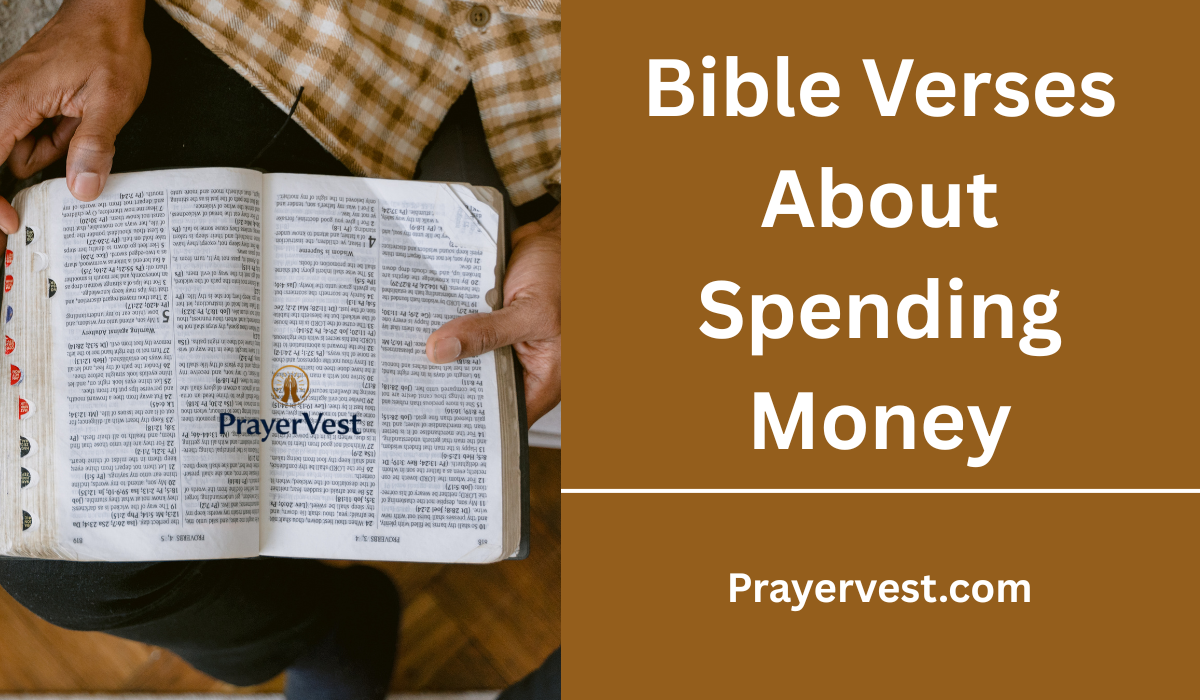Although spending money is an essential aspect of daily living, the Bible reminds us that how we use our resources matters just as much as how we get them. God commands His people to use their money sensibly, judiciously, and generously, making sure that every expenditure aligns with His principles.
Scripture offers timeless guidelines that help us prioritize what really matters, prevent wastefulness, and discern between necessities and wants. In addition to providing for our needs, we honor God with the resources He has given us when we spend in a way that is consistent with biblical teaching.
Spending without any consideration or forethought is simple in today’s materialistic and instant gratification culture. However, the Bible emphasizes the value of self-control, stewardship, and satisfaction when making financial decisions.
Spending prudently entails avoiding the need to follow trends or look for identity in material belongings. Rather, we are urged to concentrate on investments that have long-term worth, both material and spiritual. This viewpoint enables us to spend our money in a way that will benefit us both now and in the future.


For believers who wish to make loyal financial decisions, these Bible verses about spending money operate as a practical and spiritual compass. God’s Word provides clear guidance on how to invest in kingdom work, assist loved ones, buy needs, and give to the underprivileged. By considering these verses, we are reminded that every purchase is a chance to give thanks, honor God, and show good stewardship. By doing this, we transform spending into an act of worship and deliberate living rather than just a transaction.
40 Powerful Bible Verses About Spending Money (2026)
1. Proverbs 21:20
“The wise store up choice food and olive oil, but fools gulp theirs down.”
This verse contrasts the careful planning of the wise with the reckless consumption of the foolish. It emphasizes the importance of saving and making thoughtful financial decisions instead of spending impulsively. God’s wisdom calls us to be intentional with our resources, ensuring that what we have today can also provide for tomorrow.
2. Luke 14:28
“Suppose one of you wants to build a tower. Won’t you first sit down and estimate the cost to see if you have enough money to complete it?”
Here, Jesus uses a practical illustration about construction to teach a broader lesson on foresight and planning. Before making any commitment—financial or otherwise—we are urged to count the cost. This principle applies directly to spending money: wise stewardship involves calculating expenses and ensuring that we live within our means.
3. Proverbs 22:7
“The rich rule over the poor, and the borrower is slave to the lender.”
This proverb delivers a sober warning about the dangers of debt. Spending beyond our means can lead to bondage, limiting our freedom and placing us under the control of creditors. The verse encourages us to approach money management with caution, avoiding unnecessary borrowing and prioritizing financial independence.
4. Matthew 6:19-20
“Do not store up for yourselves treasures on earth, where moths and vermin destroy, and where thieves break in and steal. But store up for yourselves treasures in heaven…”
Jesus redirects our focus from material possessions to eternal investments. While responsible spending is important, our ultimate goal should be to use money in ways that advance God’s kingdom. This means prioritizing generosity, helping the needy, and supporting ministries over accumulating temporary luxuries.
5. Hebrews 13:5
“Keep your lives free from the love of money and be content with what you have, because God has said, ‘Never will I leave you; never will I forsake you.’”
This verse speaks directly to the heart of financial stewardship—contentment. Overspending often comes from dissatisfaction and the desire for more, but Scripture calls us to find peace in God’s presence rather than material possessions. Trusting in His provision frees us from the pressure to spend to feel secure or satisfied.
6. Proverbs 13:11
“Dishonest money dwindles away, but whoever gathers money little by little makes it grow.”
This proverb warns against seeking quick riches and encourages disciplined, gradual growth in financial resources. In terms of spending, it reminds us that money gained honestly and used wisely is more sustainable. Careful budgeting and consistent saving lead to stability, while reckless or dishonest spending leads to loss.
7. 1 Timothy 6:10
“For the love of money is a root of all kinds of evil. Some people, eager for money, have wandered from the faith and pierced themselves with many griefs.”
Paul’s warning to Timothy addresses a heart issue: loving money more than God. When spending is driven by greed or obsession with wealth, it can lead to spiritual compromise and personal harm. God calls us to use money as a servant, not to let it master our desires.
8. Proverbs 23:4-5
“Do not wear yourself out to get rich; do not trust your own cleverness. Cast but a glance at riches, and they are gone…”
This proverb reminds us of the fleeting nature of wealth. Chasing money through overwork or constant spending leaves us drained and unsatisfied. Instead, God’s wisdom encourages balance—working diligently, spending responsibly, and trusting Him for lasting provision rather than obsessing over riches.
9. Ecclesiastes 5:10
“Whoever loves money never has enough; whoever loves wealth is never satisfied with their income. This too is meaningless.”
Solomon captures the emptiness of a life driven by constant spending and accumulation. No matter how much we have, the craving for more can never truly be satisfied. Wise spending flows from a heart of contentment, recognizing that joy comes from God, not possessions.
10. Proverbs 28:20
“A faithful person will be richly blessed, but one eager to get rich will not go unpunished.”
This proverb links financial blessing to integrity. Those who spend and manage money with honesty and faithfulness are more likely to experience lasting prosperity. In contrast, reckless or dishonest pursuit of wealth can lead to moral and financial ruin.
11. Matthew 6:24
“No one can serve two masters… You cannot serve both God and money.”
Jesus makes it clear that our loyalty cannot be divided. If our spending patterns reflect a love for money above all else, it becomes a form of worship. Wise stewardship means placing God above financial gain, letting our money serve our faith rather than compete with it.
12. Proverbs 27:23-24
“Be sure you know the condition of your flocks, give careful attention to your herds; for riches do not endure forever…”
In ancient times, flocks represented wealth. This verse calls for careful oversight of what we own—whether it’s livestock, a bank account, or investments. Responsible spending starts with knowing exactly what we have and managing it wisely, recognizing that wealth can vanish without warning.
13. Luke 3:14
“Be content with your pay.”
In John the Baptist’s teaching to soldiers, he addressed greed and financial dissatisfaction. Spending beyond our means often stems from discontentment with income. God’s Word challenges us to live within our resources and trust Him for provision rather than overspending to chase status or comfort.
14. Proverbs 11:24-25
“One person gives freely, yet gains even more; another withholds unduly, but comes to poverty. A generous person will prosper…”
This paradox reminds us that generosity often leads to greater blessings. Spending should not only focus on personal wants but also on meeting the needs of others. God honors those who give freely, multiplying their resources in unexpected ways.
15. Isaiah 55:2
“Why spend money on what is not bread, and your labor on what does not satisfy?”
This question from God calls us to evaluate our spending priorities. Many purchases promise happiness but fail to deliver lasting satisfaction. True fulfillment comes from investing in what nourishes the soul—spiritual growth, relationships, and kingdom purposes.
16. Proverbs 12:11
“Those who work their land will have abundant food, but those who chase fantasies have no sense.”
This verse warns against wasting resources on get-rich-quick schemes or unwise investments. Spending should be grounded in diligence and productivity, ensuring that our efforts bring real, lasting returns instead of empty promises.
17. Proverbs 14:23
“All hard work brings a profit, but mere talk leads only to poverty.”
This verse highlights the value of diligence over empty promises. Spending wisely begins with earning honestly. Without consistent effort, financial resources dwindle, but when we work faithfully, our earnings can be managed and spent in ways that honor God.
18. 1 Corinthians 16:2
“On the first day of every week, each one of you should set aside a sum of money in keeping with your income…”
Paul’s instruction to the church at Corinth encourages planned giving. Just as we budget for expenses, we should also intentionally budget for generosity. This disciplined approach to spending ensures that God’s work remains a priority in our finances.
19. Proverbs 15:27
“The greedy bring ruin to their households, but the one who hates bribes will live.”
Greed-driven spending not only harms an individual but can also destabilize an entire family. This verse warns against dishonesty and selfish accumulation, urging integrity and ethical choices in how money is earned and spent.
20. Matthew 25:21
“Well done, good and faithful servant! You have been faithful with a few things; I will put you in charge of many things.”
In the Parable of the Talents, Jesus affirms that wise management of resources leads to greater responsibility and blessing. Spending within God’s principles positions us to be trusted with more.
21. James 5:1-3
“Now listen, you rich people, weep and wail because of the misery that is coming on you… You have hoarded wealth in the last days.”
James offers a sobering warning against hoarding wealth selfishly instead of using it to bless others. Overspending on luxuries while ignoring those in need is inconsistent with God’s heart for justice and generosity.
22. Proverbs 10:4
“Lazy hands make for poverty, but diligent hands bring wealth.”
Spending habits often reflect our work ethic. Laziness can lead to a lack of resources, resulting in poor financial decisions. Diligence, on the other hand, creates stability and room for wise spending.
23. Luke 16:11
“So if you have not been trustworthy in handling worldly wealth, who will trust you with true riches?”
Jesus connects financial stewardship with spiritual responsibility. If we waste money through careless spending, we show we cannot be trusted with greater blessings—whether financial or spiritual.
24. Psalm 37:21
“The wicked borrow and do not repay, but the righteous give generously.”
This verse warns against irresponsible debt. Spending beyond our ability to repay damages both finances and integrity. God calls us to live debt-free whenever possible, enabling us to give freely.
25. Proverbs 19:17
“Whoever is kind to the poor lends to the Lord, and he will reward them for what they have done.”
This verse reframes generosity as an investment in God’s economy. Money spent helping those in need is never wasted—it brings eternal returns and invites God’s blessing.
26. Deuteronomy 8:18
“But remember the Lord your God, for it is he who gives you the ability to produce wealth…”
Wise spending starts with recognizing God as the source of all income. When we acknowledge His role, we spend with humility and gratitude rather than pride.
27. Proverbs 16:8
“Better a little with righteousness than much gain with injustice.”
This verse teaches that how we obtain and use money matters more than how much we have. Spending honestly honors God, even if our resources are modest.
28. 2 Corinthians 9:7
“Each of you should give what you have decided in your heart to give, not reluctantly or under compulsion…”
Generosity is most meaningful when it is intentional and cheerful. Budgeting for giving ensures that our spending reflects a willing heart, not guilt or pressure.
29. Proverbs 17:16
“Why should fools have money in hand to buy wisdom, when they are not able to understand it?”
This verse warns against spending on things we are not ready to value or use wisely. Money is best spent when it aligns with knowledge and discernment.
30. Philippians 4:19
“And my God will meet all your needs according to the riches of his glory in Christ Jesus.”
Trusting God’s provision allows us to spend without fear or anxiety. This verse encourages reliance on His supply rather than overspending to secure our comfort.
31. Proverbs 18:9
“One who is slack in his work is brother to one who destroys.”
Neglecting responsibilities leads to financial waste. Careful spending starts with fulfilling our obligations and managing resources with diligence.
32. Luke 12:15
“Watch out! Be on your guard against all kinds of greed; life does not consist in an abundance of possessions.”
Jesus warns that overspending in pursuit of possessions distracts from true life. Financial decisions should serve our calling, not our desire for excess.
33. Proverbs 3:9-10
“Honor the Lord with your wealth, with the firstfruits of all your crops; then your barns will be filled to overflowing…”
Spending that prioritizes God—through tithing and generosity—invites His blessing and provision in every other area.
34. Ecclesiastes 7:12
“Wisdom is a shelter as money is a shelter, but the advantage of knowledge is this: Wisdom preserves those who have it.”
Money can protect, but wisdom ensures it is spent and used well. Without wisdom, financial security is short-lived.
35. 1 Peter 4:10
“Each of you should use whatever gift you have received to serve others…”
This verse reminds us that our financial resources are also gifts meant for service. Spending should align with God’s purpose for blessing others.
36. Haggai 1:6
“You earn wages, only to put them in a purse with holes in it.”
This vivid image warns of careless spending that drains our resources. Without wise management, money disappears without a meaningful impact.
37. Proverbs 22:9
“The generous will themselves be blessed, for they share their food with the poor.”
Spending that meets real needs attracts God’s favor. Generosity is an investment that pays both earthly and eternal dividends.
38. Colossians 3:23
“Whatever you do, work at it with all your heart, as working for the Lord, not for human masters.”
When we work with excellence, our earnings become a testimony. This motivates us to spend in ways that reflect God’s standards.
39. Psalm 24:1
“The earth is the Lord’s, and everything in it…”
All money ultimately belongs to God. This truth keeps our spending in perspective, reminding us to handle finances as stewards, not owners.
40. Malachi 3:10
“Bring the whole tithe into the storehouse… Test me in this,” says the Lord Almighty, “and see if I will not throw open the floodgates of heaven…”
God invites us to trust Him through faithful giving. When we put Him first in our spending, He promises provision and blessing beyond measure.
Conclusion
In summary, our financial decisions are a reflection of our values, objectives, and, most importantly, our religious beliefs. The eternal wisdom found in the Bible guides us in making choices that glorify God, responsibly provide for our needs, and benefit others. Spending wisely involves using discernment, avoiding needless debt, and making sure our resources are being spent for things that are in line with God’s plan rather than depriving ourselves. Every expense becomes a chance to practice biblical stewardship when we handle our finances with focus and prayer.
In the end, living a life of more contentment, charity, and peace results from spending money in God’s way. Applying the biblical teachings helps us avoid falling into the temptations of consumerism, impulsive spending, and an unhealthy reliance on wealth. Rather, we develop behaviors that demonstrate faith in God’s supply and a willingness to make investments in things that will last. We gain financial security and the satisfaction of knowing that our resources are being used for His glory when we dedicate our spending habits to Him.






